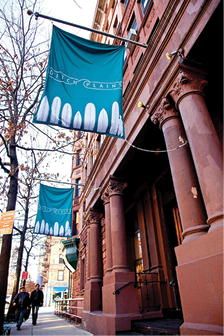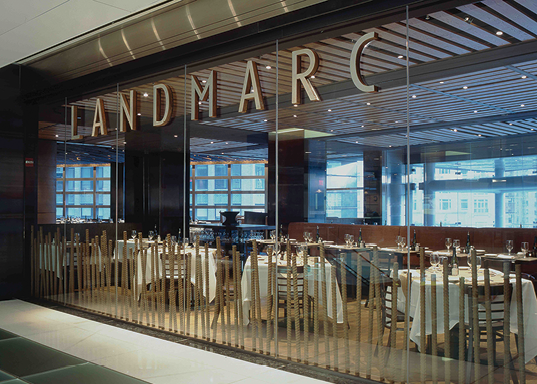


![]()
ONLINE

Setting a Benchmarc
Editors’ Note
Following graduation from the Institute of Culinary Education, Marc Murphy apprenticed at restaurants in France and Italy before returning to New York where he landed a job as a line cook at Terrance Brennan’s Prix Fixe. He stayed there for almost two years, working his way through every station in the kitchen and forging a professional bond with Brennan’s Sous Chefs Joseph Fortunato and David Pasternack. Murphy then flew to Paris and landed a position at the one-star Le Miraville, where he stayed for one and a half years. After this, he staged at the famed Louis XV in Monte Carlo, where Executive Chef Alain Ducasse was so impressed that he made arrangements for him to work with Sylvain Portay at Le Cirque once he returned to the States. Following Le Cirque, Fortunato tapped him to work as a Sous Chef at Layla, Drew Nieporent’s Middle Eastern fantasy in TriBeCa, where he met consultant George Masraff. When Masraff opened Cellar in the Sky at Windows on the World, he recruited Murphy to serve as Executive Chef. After receiving critical acclaim, Murphy headed uptown to serve as Executive Chef of La Fourchette. In March 2004, Murphy opened his first solo enterprise with Landmarc (Tribeca), which is celebrating their 10-year anniversary this year. Following Landmarc’s success, Murphy opened Ditch Plains in the West Village in 2006. In 2007, he opened another Landmarc restaurant in the Time Warner Center. Ditch Plains expanded with an outpost on the Upper West Side in the spring of 2011. Murphy’s restaurants now fall under the Benchmarc Restaurants by Marc Murphy (benchmarc-events.com) and he also heads up the company’s catering division, Benchmarc Events by Marc Murphy. In October 2013, Murphy opened Kingside with Scott Gerber at the Viceroy New York on 57th Street. Today, Murphy has a regular role as a judge on Food Network’s show Chopped, as well as past appearances on Iron Chef America, Good Morning America, NBC’s TODAY Show, and The Rachael Ray Show, among others.
Murphy’s involvement in the philanthropic world is evident by his role as President of the Manhattan chapter of the New York State Restaurant Association, a board member of City Harvest, Culintro, and Passport NYC at the 92nd Street Y Culinary Camp. He is also a board member of the Food + Finance High School Industry Advisory Board, a member of the Leadership Council for Share our Strength’s No Kid Hungry campaign, and the national spokesperson for Share Our Strength’s Dine Out For No Kid Hungry.
What did you see in the market that made you feel the opportunity was right to create Benchmarc?
I opened Landmarc with my wife in TriBeCa 10 years ago and we are thrilled to be celebrating its milestone anniversary this year. I had always worked at high-end restaurants and I wanted to create a restaurant where I could apply everything I had learned, but where I could also have friends and people in the neighborhood come in three or four times a week.

Ditch Plains on 82nd Street
on New York’s Upper West Side
I wanted the food to be accessible, but I also understand a restaurant isn’t just about the food or the chef: it’s about the lighting, the ambiance, the wine prices – the whole package that people come in to experience.
The restaurant just flourished, and when you have a great team working with you, you need places for them to grow.
So we ended up opening Ditch Plains in the West Village a few years later and we called it the New York-style fish shack. It was more modern, but we still serve lobster rolls, oysters, and beer on tap – fun stuff.
A few years later, we got a call from Time Warner Center to open a Landmarc there. It’s a great brand and people love the accessibility of it. It’s uncomplicated food that’s really good.
In between that, I started a catering company. We were introduced to a couple who had met at Landmarc TriBeCa and returned many times on dates, and they were getting married and wanted me to cook dinner for them and their guests.
So we started our catering company, where we do all of our production. It’s growing; we have a director and executive chef plus five salespeople.

Landmarc at Time Warner Center
off New York’s Columbus Circle
How do you remain innovative at a place like Landmarc when people come on a regular basis?
I consider all of my restaurants neighborhood restaurants, and to me, a neighborhood restaurant has to have a couple of things: the most important is consistency. I would say 65 percent of my menu never changes. Also, it’s a huge menu. We change the menu three or four times a year, and those are seasonal changes. But as the years have gone by, we still have people requesting the fan favorites.
I also have a chef in every one of my restaurants who works closely with me and we’re constantly running specials. It provides new items for the regulars and also allows my executive chefs to flex their creativity so they don’t get bored and go elsewhere.
If you have a brand and a product people really like, if they show up and you are doing stuff that is completely off the wall, people may be disappointed. We have to do what we do, and do it well. Even the specials have to respect your basic vocabulary.
How do you provide the type of offerings you have and still maintain a healthy focus?
It’s incredibly important to me and we have been honing in more on it. I’d love to get corn syrup completely out of our restaurants – it’s going to cost us a lot of money, but I’m going to give it a try.
If I can, I’d love to go to grass-fed beef and things like that. I want to make these changes. We have been making them as we go step by step, meticulously, but it’s going to take some time. Our country is going the wrong way with our food chain and I think chefs have to step up and start paying attention.
On the event side, do your focus and capabilities stretch across all type of events?
We work directly with clients to create menus of all sizes and types of food. We can do whatever you want, but we will not overextend ourselves. You have to always perform to build a loyal clientele.
How did your involvement with Kingside and the Viceroy New York hotel come about, and what makes for a successful restaurant in a hotel setting?
We took the same philosophy of our brand and brought it to Kingside, but put it on steroids as far as creativity goes. We’re changing the menu more often.
It’s what people want in a hotel. We’re getting a lot of hotel guests who are interested in the fun new foods.
It’s also interesting for me creatively to do different food and we’re calling it new American, which gives me a license to do more international things.
We’re considering ourselves a neighborhood restaurant that just happens to be in a hotel, plus we’re doing room service and have gotten a lot of compliments on it.•